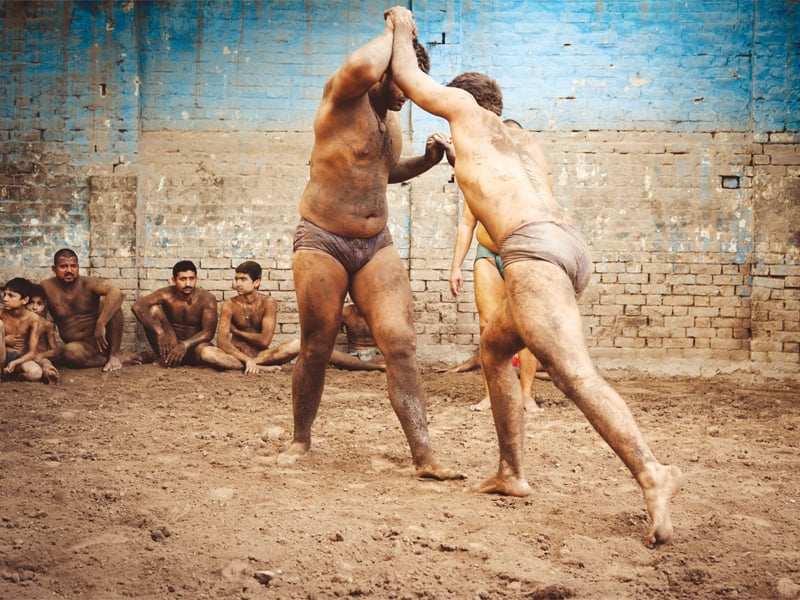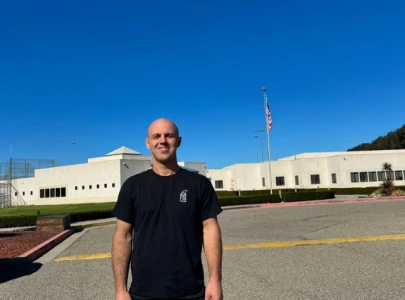

Even the strongest of pehalwans go weak in the knees when it comes to tackling poor funding. PHOTOS: FASEEH SHAMS
Countrywide, there has been a rapid decline in the number of pehalwans, surprisingly even in Punjab that houses quite a few famous akharas (a place of practise), including the Bamma Pehalwan’s Akhara in Lahore and Jinnah Health Club in Gujranwala. Thousands of spectators cheer from the sidelines during matches, but the one missing voice is that of the sports authorities who have invested little more than the dirt the men wrestle in. And many angry pehalwans have made it a point to be vocal about it.
“The government doesn’t even have a proper organisation for sports,” says Gujranwala’s Umar pehalwan, who has represented Pakistan in many international championships and won his first gold medal in 1991 at the Senior National Championship in Sargodha. In 2009, he was titled the best player of the year and was awarded Rs1,000,000 from the government. Despite his own achievements, Umar criticises the marginalisation of the sport. “People at the top management level (in the government-run organisations) have no knowledge about the sport.” The role of the Punjab Sports Board for one leaves a lot to be desired.

Even the strongest of pehalwans go weak in the knees when it comes to tackling poor funding. PHOTOS: FASEEH SHAMS
With a rich history and even richer soil, Punjab is famous for raising pehalwans. The legendary Gama Pehalwan, born in in Amritsar, famously known as the ‘Great’ Gama, is one of them. His strength is said to have inspired Bruce Lee who started following his exercise routine. Gama became the world heavyweight champion in 1910 during the British Raj in the subcontinent and moved to Pakistan after Partition, where he is hailed as the only undefeated kushti player, even 53 years after his death. This glorious past throws its impoverished present all the more into relief.
As with other sports, it takes immense dedication and hard work to make it as a pehalwan. Umar started training at the age of ten. “There are two types of training; the traditional kushti played in a mud pit and Olympic style which is practised on a mat,” he explains. Currently around 100 to 150 pehalwans are training at the Jinnah Health Club. “And six to seven of them are selected every year for the national games,” he says proudly.
Along with a gruelling training routine, the pehalwans must also observe a healthy diet. Although Umar himself eats less, following a latest international theory that focuses on a stricter training regimen, he says, “there are those who consume two to three kilogrammes of meat, five to six litres of milk, almonds and desi ghee.”

Even the strongest of pehalwans go weak in the knees when it comes to tackling poor funding. PHOTOS: FASEEH SHAMS
But fewer pehalwans can now afford such a high-protein diet. “Nearly 90% of them are from poor, farming families,” says Bhola pehalwan from an akhara in Lahore. “Only a handful of them belong to the educated class.” Bhola strongly believes that wrestling is a passion and only a few, who manage to survive the rigorous training and government setbacks, make it to the top.
While some might go on to be crowned champions in the international arena, others will have to settle for a lot less, and even take on additional jobs to earn a decent living. “Only national champions get a job at the railways or banks,” says Umar. According to him no competitions are organised in the country and most pehalwans are poorly paid. The end result is that the disillusioned ones end up quitting altogether. Umar, struggling for the past three years to get government recognition for the sport, even wrote to the chief minister and prime minister to take notice of their plight, but has yet to receive a positive response. The only time anyone did help was when the roof of Jinnah Health Club collapsed; repairs were undertaken by the authorities but the project was never completed. And Umar had to pick up from where they left off.
Despite being one of the oldest sports of the region, kushti has suffered increasing neglect, even taking a beating from the increasingly popular sport of cricket. With the nation’s spotlight cast on heroes like Shahid Afridi and Saeed Ajmal, very few channels screen matches. At the 2011 Pakistan-India wrestling tournament held at the Jinnah Stadium, Lahore, Umar swears, “there was no place to stand, people by the thousands had come to watch the dangal (bout).” Although this government-sponsored match was free for all to watch, the average ticket for a private bout costs between Rs100 to Rs500.

Even the strongest of pehalwans go weak in the knees when it comes to tackling poor funding. PHOTOS: FASEEH SHAMS
Even though kushti can still attract crowds, the sport has yet to draw in government funds. Those who play the sport internationally are overwhelmed by the way other nations treat their champions. “When I went to Turkey recently for a tournament, I was amazed by all the facilities provided to wrestlers,” says Umar. From housing to basic mats for training, the government ensures that its wrestlers are well taken care of. “If our government would allot Rs5,000,000 to Rs6,000,000 to the sport, our pehalwans would be motivated enough to win gold medals at the Olympics.”

But as it stands, only a mere sum of Rs500,000 from the annual budget is allotted for wrestling. According to Syed Aqil Shah, chairman of the Pakistan Wrestling Federation (PWF), donors have to be approached to gather more funds to support the pehalwans. And while these pehalwans get their hands dirty daily during training, hoping to keep the sport alive, the authorities choose to look the other way. Today, even a minor injury to a cricketer will make rounds in the news for days, but if a pehalwan breaks a rib during a spar, very few might get to hear his tale of bravery.
Dilaira Mondegarian is a sub-editor on The Express Tribune Magazine desk. She tweets @DilairaM
Faseeh Shams is a London-based entrepreneur/Marketeer who likes to take photos in his free time. He tweets @faseeh
Published in The Express Tribune, Sunday Magazine, December 15th, 2013.


1725612926-0/Tribune-Pic-(8)1725612926-0-165x106.webp)














COMMENTS
Comments are moderated and generally will be posted if they are on-topic and not abusive.
For more information, please see our Comments FAQ